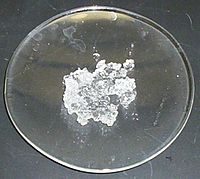
Photo from wikipedia
Abstract Locally induced chemical conversion processes seem to be a new way for increasing the tribological performance of engineering plastics. In this study, we investigate the role of magnesium hydroxide… Click to show full abstract
Abstract Locally induced chemical conversion processes seem to be a new way for increasing the tribological performance of engineering plastics. In this study, we investigate the role of magnesium hydroxide as a tribologically active component by calculation and experiment. Incorporating 20 vol.-% of the filler into a polyamide 66 composite causes a significant improvement of friction and wear resistance. Through extensive structural and chemical analyses of the transfer films on the 100Cr6 counterparts, we are able to show that local temperatures are high enough to trigger the fillers endothermic reaction and that reaction products accumulate in the contact interface. Magnesium hydroxide could be a new lever for creating smart materials that inherently react to changes in the systems boundary conditions.
Journal Title: Tribology International
Year Published: 2020
Link to full text (if available)
Share on Social Media: Sign Up to like & get
recommendations!